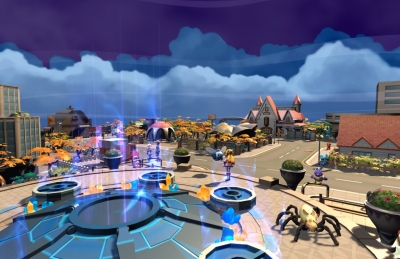Most people tend to believe that computer games are harmful. Yes, of course, the abuse of computer games leads to deplorable consequences, but this is how things are not only with games but with other things. Students love playing computer games, sometimes they play too much and don’t have time for academic writing. In this case, they can pay for essay online. In this article, I want to tell you about 6 benefits of computer games.
Improving physical performance
It is believed that one of the most common side effects of games is to reduce sports abilities. However, it is wrong. Scientists say that children aged 3 to 6 years, who play computer games, have higher physical performance.
Improving focus
Analysis of Professor Daphni Bavier says that comparing the dynamic sharpness of the vision of people who regularly play games and those who do not play, it turned out that the players have a more dynamic vision. Especially in the games of the genre of action. Italian researchers presented evidence that the game can improve the reading skills of children with dyslexia. The team of researchers divided children aged 7 to 13 years into two groups, one of which played a fighting game called Rayman Raving Rabids, while the other played a lower pace game. Those kids who played the fast-paced game could read faster and more precisely. The authors of the study suggested that action games help children increase their attention coverage.
Improving the functions of the brain
Professor Simon Kun from the Institute of Human Development Max Planck writes that after testing the game “Super Mario 64 DS” for 2 months and analyzing the state of the brain with the help of MRI, observed the development of three places - the cerebellar, the right hippocampus and the prefrontal cortex.
Improving the ability to process information
Japanese researcher, Professor Hiroki Yuga analyzed the relationship between the video game and the ability to process information for kindergarten children. The result of the test showed that people familiar with video games think faster. From this, it follows that the ability to process information increases when playing video games.
Improving well-being and satisfaction in life
According to a study conducted by Dr. Andrew Pshibylsky, children who play the game for one hour a day are more satisfied with their lives. In addition, the possibility of communication in the game with other children is no less important.
Improving the possibilities of processing several tasks
Dr. Sabrina Shenk, who studies at the University of German Rules Bochum, researched a group of people who played games for more than 20 hours a week, and a group that did not play games at all.
The content of the study was that both sides solve puzzles that would check academic abilities. The results showed that a group of people who usually play games showed the best result. In addition, they noted that people playing games use a multitask approach.
Of course, everything should be used in moderation, especially things that please us. Therefore, you need to try to play as little as possible, because positive effects can develop into negative ones.
“Theories and Practice” have already talked about simple ways to train the mind, memory, and attention. In continuation of this topic, there is reasoning about what intellectual abilities are, how to develop them and what computer games are.
What's the point?
The need to train the mental functions of the brain responsible for obtaining, processing, and storing information leads to an increase in the popularity of Internet resources offering online games for the development of mental abilities. The market for these useful amusements will grow and, according to the research of the Sharp Brains analysts team.
However, the commercial success of the venture forced scientists to argue even more about whether it is possible to develop the intelligence of an adult and whether special computer games can help. While some scientists claim that such fun even harms, others prove that part of our intelligence, which is called mobile, can be actively developed with the help of games. Another study demonstrates a completely simple truth: even the usual reading and score in the mind contribute to the development of mental abilities - and in elderly people.
What is the problem?
For educational games to work, they must become more complicated as the player moves and give him feedback. Therefore, ideally, the developer of such a game should first conduct a study that would confirm that this game develops cognitive functions - and develops precisely the functions for which it was developed (all this is called “validity”). This requires an experiment-it is necessary to force the focus group for a month to play the game.
Since the field of developing computer games is quite new, the standards for their development have not yet been developed, so each creator of the game is based on his flair. This leads to the fact that when an article extends, criticizing the futility of games, both good and bad fall under one comb.
Why is everything so difficult?
Intelligence, attention, thinking, memory - all these are hypothetical constructs. What is a hypothetical construct? Our psyche is a certain black box, and scientists can only guess what is happening there. For example, if you take any box and drop it two meters from a height, then by evaluating the deformation of its body, we can make some assumptions about its internal structure.
So with a person: having given him some task and assessing the results of his activity or his internal sensations, we can make some assumptions regarding his abilities. One subject will solve it quickly, the other slowly, the third non-standard, and the fourth will not be able to solve it at all but will be able to enjoy it.
After that, a palette of scientific hypotheses will arise, the tasks are specified, the experimental conditions will become more stringent and somewhere in a few dozen different experiments we would conclude that there are people who quickly solve problems, there are slowly solving problems, and all this correlates with their age. And we will call the measure of this attitude intellect. Although in fact, no one knows what this intelligence looks like or how its neural structure is organized, it is only a construct for describing the processes occurring in a black box.
However, even if the game is reliable and valid, it may not work for a specific user. Because the development of a particular cognitive function depends on the age of the player, his health, and the development of other functions. A healthy brain does not develop as damaged or underdeveloped, children do not develop like adults, and memory is not to be without attention.
For example, for preschoolers, brain development is directly related to the development of fine motor skills. And no computer game, at least at the current level of technical development, will replace him with real subject activity: modeling plasticine, games on musical instruments. It is not clear whether the same objective activity will positively affect the intellectual abilities of adults. The level of development of some functions can also affect the development of others.






